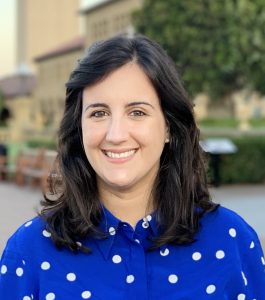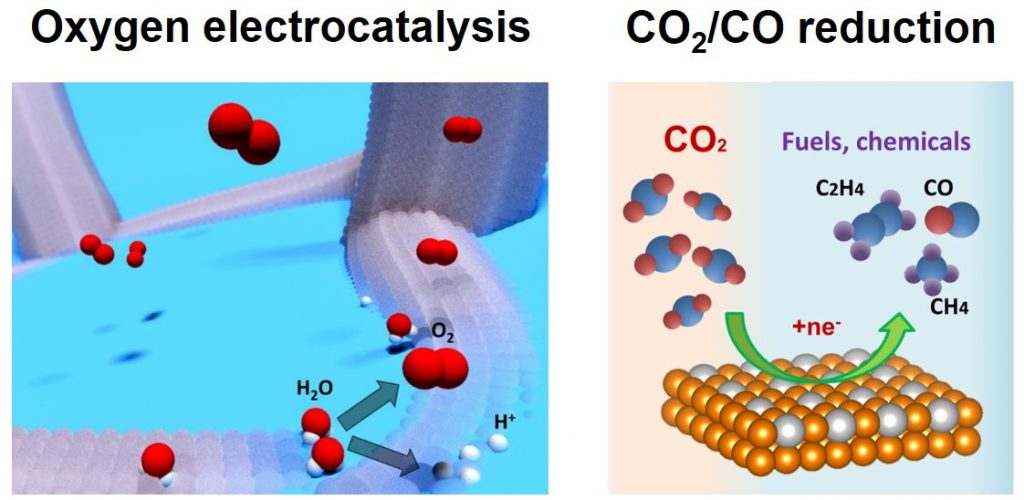ECS is proud to present Dr. María Escudero-Escribano via webinar on January 13, 2021, at 1000h ET.
Oxygen and Carbon Monoxide Electrocatalysis for Renewable Energy Conversion
Dr. María Escudero-Escribano
Assistant Professor of Chemistry
University of Copenhagen, Denmark
Date: January 13, 2021
Time: 1000h ET
The design and development of active, stable, and selective electrocatalysts for energy conversion reactions is key for the transition towards a sustainable future. Tailoring the electrochemical interface structure at the atomic and molecular levels allows the understanding of structure/function relations and enhances the electrocatalytic performance for renewable energy conversion. The webinar presents recent strategies to understand and engineer the interfacial structure and properties for oxygen and carbon monoxide/carbon dioxide electrocatalysis.
The first part focuses on oxygen reduction and evolution reactions (ORR and OER, respectively) in which slow kinetics limit the performance of proton exchange membrane fuel cells and electrolyzers. Work on oxygen electrocatalysis is discussed, from model studies on well-defined surfaces to the development of self-supported high-surface area nanostructured catalysts for ORR and OER.
The second part covers recent work on Cu single-crystalline electrodes in contact with different electrolytes to understand the structure sensitivity for CO2 and CO reduction. The effect of pH, anion adsorption, and potential dependence of interfacial processes for CO reduction has been studied. The essential nature of model studies is demonstrated in order to understand the structure-property relationships and design efficient electrocatalysts for sustainable energy conversion.
Benefits of attending the webinar
Learn about:
- Oxygen electrocatalysis on well-defined surfaces to the development of self-supported high-surface-area nanostructured catalysts for ORR and OER (oxygen reduction reaction and oxygen evolution reaction)
- Cu single-crystalline electrodes in contact with different electrolytes aiming to understand the structure sensitivity for CO2 and CO reduction
Dr. María Escudero-Escribano
 María Escudero-Escribano is Assistant Professor of Chemistry at the University of Copenhagen, Denmark. There she leads the NanoElectrocatalysis and Sustainable Chemistry research group which investigates tailored electrochemical interfaces for renewable energy conversion, and electrosynthesis of green fuels and value-added chemicals. She received her PhD from the Autonomous University of Madrid, Spain, in 2011, for her work on electrocatalysis and surface nanostructuring using well-defined electrode surfaces. Dr. Escudero-Escribano carried out her postdoctoral research on oxygen electrocatalysts for fuel cells and water electrolyzers at the Technical University of Denmark and Stanford University, US, before moving to the University of Copenhagen in 2017. She has chaired the Danish Electrochemical Society since 2018. Recipient of a Villum Foundation Young Investigator grant in 2018, Dr. Escudero-Escribano is Principal Investigator at the Center for High Entropy Alloy Catalysis (CHEAC), Danish National Research Foundation. Her early career achievements have been recognized by numerous national and international awards including the 2019 Spanish Royal Society of Chemistry Young Researchers Award, 2019 UniSysCat (Unifying Systems in Catalysis) Clara Immerwahr Award, 2018 Princess of Girona Scientific Research Award, 2018 ECS Energy Technology Division Supramaniam Srinivasan Young Investigator Award, and 2016 European Young Chemist Award (Gold Medal).
María Escudero-Escribano is Assistant Professor of Chemistry at the University of Copenhagen, Denmark. There she leads the NanoElectrocatalysis and Sustainable Chemistry research group which investigates tailored electrochemical interfaces for renewable energy conversion, and electrosynthesis of green fuels and value-added chemicals. She received her PhD from the Autonomous University of Madrid, Spain, in 2011, for her work on electrocatalysis and surface nanostructuring using well-defined electrode surfaces. Dr. Escudero-Escribano carried out her postdoctoral research on oxygen electrocatalysts for fuel cells and water electrolyzers at the Technical University of Denmark and Stanford University, US, before moving to the University of Copenhagen in 2017. She has chaired the Danish Electrochemical Society since 2018. Recipient of a Villum Foundation Young Investigator grant in 2018, Dr. Escudero-Escribano is Principal Investigator at the Center for High Entropy Alloy Catalysis (CHEAC), Danish National Research Foundation. Her early career achievements have been recognized by numerous national and international awards including the 2019 Spanish Royal Society of Chemistry Young Researchers Award, 2019 UniSysCat (Unifying Systems in Catalysis) Clara Immerwahr Award, 2018 Princess of Girona Scientific Research Award, 2018 ECS Energy Technology Division Supramaniam Srinivasan Young Investigator Award, and 2016 European Young Chemist Award (Gold Medal).
We thank our webinar sponsors, whose support makes these complimentary programs possible.
Read more about ECS Webinars.




